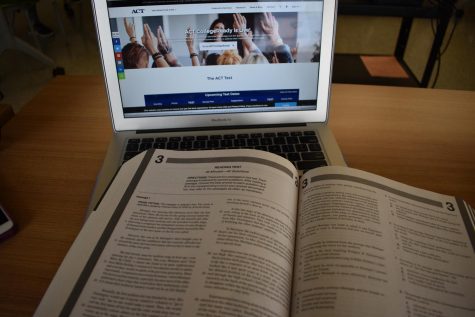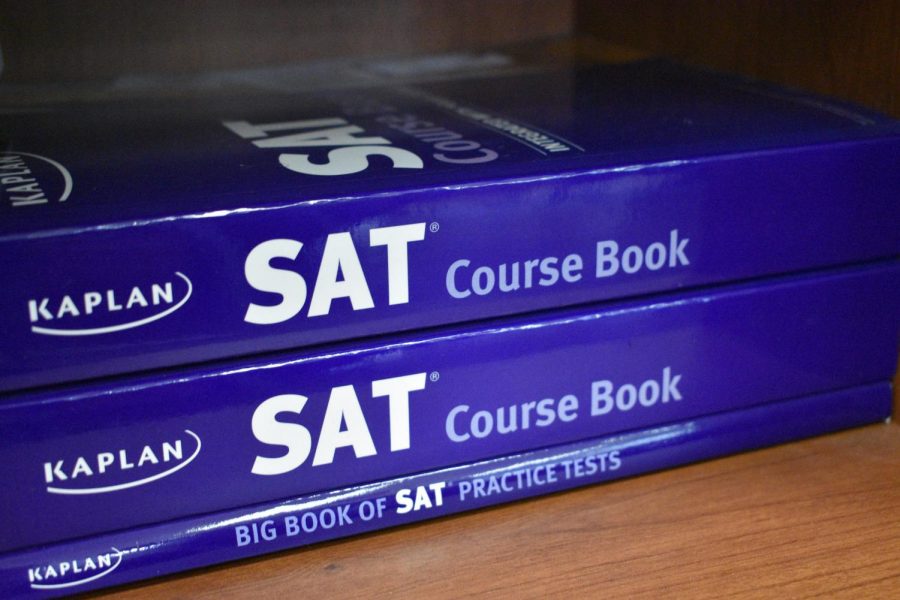Standardized testing: Where do we draw the line?
On Tuesday, April 10, all juniors took the SAT during the school day.
If you ask anyone to describe their junior year of high school, you will most likely hear the words college applications, APUSH, college visits, and most likely of all: standardized tests.
The ACT and SAT are two standardized tests that are very familiar to all high school students. Whether you’ve taken them, prepared for them, or have yet to take them, there are varying opinions on how much is too much testing.
I understand that these tests are required to take in high school in order to measure how prepared a student is for college, but all the testing seems to be a bit excessive. Just take this week for example: juniors have a required SAT test on Tuesday, April 10, and there’s an ACT test on Saturday, April 14 that many students are taking as well.
According to Princeton Review, the purpose of the ACT test is “to measure a high school student’s readiness for college, and provide colleges with one common data point that can be used to compare all applicants.” Although this is true, standardized tests seem to just be an extra component to put on college applications that provides added stress to students.
Between the ACT, SAT, MAP testing, PARCC testing, and more, the state of Illinois seems to be requiring students to take more and more tests each year. I mean, how much information does the College Board need about high school students’ test scores, and what exactly do they even do with all the information?
According to CBS News, students spend 20-25 hours a year taking standardized tests. Along with this, the average student in the United States is required to take 112 mandatory tests between kindergarten and 12th grade.
Within the past year, Illinois switched from an ACT state to an SAT state, meaning that most school districts in Illinois now require juniors to take an in school SAT instead of the ACT. This switch was implemented in the fall 2017.
In my opinion, a student’s GPA reflects their academic abilities more than any test could. There should be less of a focus on these standardized tests and obsessing over doing well on them. Some people are naturally not too great at taking tests and may get distracted or overwhelmed easily, leading them to do bad no matter how many times they take the test.
Additionally, I feel like the true goal of standardized tests is somewhat confusing and leads to students feeling like there is no purpose to them. There is a common misconception that these tests are to measure a student’s intelligence, but this is not the case.

Students have the option to take the ACT or the SAT for their scores they will be submitting to colleges, but Hinsdale Central offers the SAT as the free exam students must take in the spring.
“Standardized tests are meant to suggest a student’s level of ‘college readiness’ by demonstrating what they have learned up to that point,” said Mr. Robert Aurich, guidance counselor. “In other words, it doesn’t give a picture of intellectual potential as much as it suggests how ready a student is to tackle the work of college.”
If standardized tests really do test to see college readiness in students, then I feel like it would be more accurate if each student just took the tests once and were not allowed to tutor or prepare as much for it.
In our community, there seems to be an obsession over getting great scores on these tests and seeking tutors or extra help outside of school.
“I would say that the test prep business for HC students is thriving,” Mr. Aurich said. “Although the level of outside test prep varies, I think most students do something extra to help orient themselves better to this testing situation.”
Our school also provides online preparation sites like Khan Academy. These sources help to prepare students by teaching them strategies and getting them used to the format of the test. Many scores get magnified this way, which can lead to an inaccurate representation of a student’s college readiness.
“In tutoring, we do practice activities and practice each section of [the ACT] and correct homework,” said Lexie Henry, junior, who gets tutored at Nurturing Wisdom Academy in Hinsdale.
Additionally, excessive preparation can place students in a better financial situation who can afford tutors and resources at an unfair advantage over those from lower income families.
If a student makes it through four years of high school, then they should be prepared for college. Colleges should stick to checking a student’s GPA to measure their academic capability and standardized tests should be kept to a minimum and not be made such a big deal out of.

Michalea Halikias is a senior who can often be found shopping online, listening to music, or hanging out with her friends. She loves watching Master Chef,...













